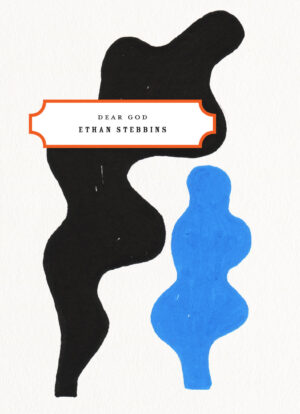from Dear God
In Their Own Words
Ethan Stebbins on a poem from Dear God

But so this is where the analogy ends
and your measure begins the mown field remits a month
of vetch and aster cider apples bombard the hills
of Onondaga you’ve been out beating back the woods
and chewing through the bush you file down the days
and pile up the nights shave your head and send the pricks
to penance I think how much less you think about me
than me escaped me up until this very second
I should be grateful the absence of expectation
however brief allows the love it does from now on
may vowels of thanks scour my mouth thanks
for giraffes and trapezoids sumac and mitochondria
mornings like blades you harvest up my wild mind
and hold your peace between the meanings
Reprinted from Dear God (Poetry Society of America, 2022). All rights reserved.
The following is a brief description of where I was when I was waking very early and walking outside to try to catch these poems before they ran away.
I was living in a house in a room with a window. The window faced the yard. On the side of the yard was a mid-century school bus. If you walked through the yard past the bus through a line of maple you entered an empty unmowed field adjoining another mowed field full of grey and white gravestones, a graveyard. On one side of the field(s) through more trees you could see the brown sheds of the town’s maintenance facility; on the other past the graveyard, the tan crater of a sand pit. The bus’ tires were flat and crazed with little cracks, like dry mud. The proximity of the one operation (depositing, consecrating) to the other (mining, desecrating), seemed notable. If you looked closely at the side of the bus it said SCARBOROUGH in faded black caps. Our town was not Scarborough. Nor was the field actually empty—it was only empty in relation to the field beside it gridded with graves. The field was full: fescue, vetch, milkweed, diminutive moss and strawberry, high clumps of golden rod and Canadian thistle, Queen-Anne’s lace, black-eyed Susan, etc. The town, or their maintenance facility, or some combination of both, was called the “Public Works.” The yard, up to the tree line, was Private. My most meaningful connection to the town concerned my role as beneficiary of their waste collection services. I knew no one. I never learned why there was a decommissioned school bus rotting in the yard. It felt inevitable and geologic, a rock left by a receding glacier. Every town in the surrounding area had different colored, municipally authorized trash bags you had to buy on your own dime. We were blaze orange; on trash day the streets looked lined with dumpy pumpkins. Another thing the field was full of was constant electric insect-life…except of course in winter, when the sky collapsed and the grass lay flat like brown yarn. But that’s another story. The field felt free and at the same time highly systematic; it had it down to a science. Our town’s motto was “The Town Where Others Began.” It wasn’t clear how wistful this was. Part of what was weird about the bus was someone had removed the seats and lined the walls and floor with thick fascia-colored carpet, making it carcass-like inside. You entered by a set of steps through the rear door, formerly reserved for emergencies. To enter the field was to be received by something too important and complicated to include you. You were unincorporated, a mercy. The bus felt strangely stable in its state of decay. It occurred to me the empty state of the not-empty field wasn’t stable, that one day it would be full of graves. The graveyard was filling up and spreading out. It was all part of the same thing, owned and maintained by the town.



